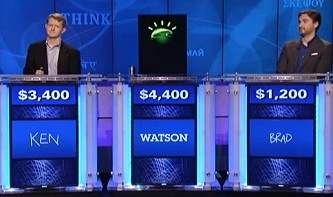Nearly half a decade of hard work from some of the most intelligent computer engineers in the world, many of them holding PhD’s in at least one field, culminated in an event that began on Monday. The results?
[Spoiler Alert]
Like a traditional Jeopardy tournament game, the so-called “IBM Challenge,” in which Jeopardy heavyweights Ken Jennings and Brad Rutter compete against the computing company’s human-like supercomputer Watson, this competition is spread out over two games of Jeopardy. The final scores of both games will be combined to determine the winner.

In the first episode, only a single round of the first game was played. The rest of the episode was filled with background information about Watson.
So we only got a brief look at how Watson can stand up to the top human specimens, but so far it has done a more than admirable job.
Watson came in fast and hard, stealing away the Daily Double early in the game and then running with the game for the bulk of the round, making it seemingly impossible for the human contenders to catch up.
Despite a couple of flubs (e.g., ringing in with a high-confidence answer of “finis” for a clue that was actually looking for “terminal”), Watson was pretty spot on. The
Jennings and Rutter seemed almost irritated at times when Watson beat them to the buzzer like clockwork. In fact, nearly every time that either one was able to answer a question was when Watson’s “confidence” meter wasn’t even high enough to trigger a ring-in in the first place.
Where Watson did mess up, it demonstrated potentially fundamental flaws in the system’s design instead of bad information. For example, on one clue that was looking for a response of an athlete missing a leg, Watson responded, “What is leg?” This shows that Watson’s answering ability is probably limited to simpler answers, like the names of people or places, even though it can logically understand complex sentences in a question to reach those answers.
The other flub was when Jennings buzzed in with a response to a question of, “What are the 1920s?” Host Alex Trebek said that was incorrect, but Watson immediately rung in afterward and gave the same answer. Because of the way Watson is programmed, answers from other players have no effect on its thinking process. It is working based on the question itself.
But, there is something to be said about the fact that Watson came up with the same answer as Jennings, even though it was wrong. That means the same human thought process is being mimicked in some sense.
In the end, Jennings ended the round with a meager $200, thanks to a few incorrect answers on high-value questions. But it wasn’t a runaway for Watson. Rutter, who missed no questions, finagled his way up to $5,000, the same score as Watson.
So on the next episode, Watson and Rutter will be tied. Jennings will pick the first clue in Double Jeopardy, where there is more money and a new slate of categories. After the first day, it’s certainly worth tuning into.






